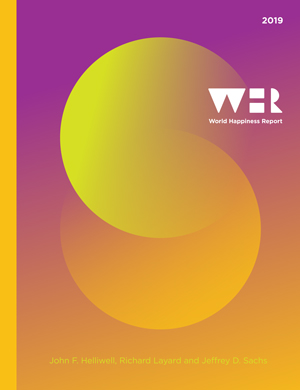World Happiness Report 2019
Finland retains its title as the happiest country in the world!
 What is the World Happiness Report?
What is the World Happiness Report?
The World Happiness Report (WHR) 2019, which ranks 156 countries by how happy their citizens perceive themselves to be, according to their evaluations of their own lives, analyzes how life evaluations and emotions, both positive and negative, have evolved over the whole run of the Gallup World Poll, starting in 2005-2006. For life evaluations at the national level, there have been more gainers than losers.
The report is produced by the Sustainable Development Solutions Network (SDSN) with the support of the Ernesto Illy Foundation, is edited by Professor John F. Helliwell of the University of British Columbia and the Canadian Institute for Advanced Research; Professor Richard Layard, co-director of the Well-Being Program at LSE’s Centre for Economic Performance; and Professor Sachs, director of SDSN and the Earth Institute’s Center on Sustainable Development. Policy applications of happiness research are collected in a companion SDSN publication Global Happiness Policy Report 2019.
WHR 2019
This year’s happiness report focuses on happiness and the community: how happiness has evolved over the past dozen years, with a focus on the technologies, social norms, conflicts and government policies that have driven those changes. There is also specific focus on generosity and prosocial behavior, the effects of happiness on voting behavior, big data, the happiness effects of internet use and addictions.
Professor John Helliwell, co-editor of the report says, “The world is a rapidly changing place, how communities interact with each other whether in schools, workplaces, neighborhoods or on social media has profound effects on world happiness.”
#DigitalHappiness
At Sogeti, aware to the fact that Digital Happiness is rapidly becoming the new frontier of competition. This awareness of the emerging trend of ‘IT-humanism’ is also the motivation behind our ‘In Pursuit of Digital Happiness’ research project.
Our research report, The Happiness Advantage covers what we describe as ‘the new frontier of competition’ that no company can afford to ignore.
Fake news disrupts the view of reality, smartphone addiction leads to depression among youth, and the digital manipulation of our behavior poses a potential danger to democracy. This is scary stuff. Even Tim Berners-Lee, spiritual father of the internet, speaks of the Web being weaponized.
Happiness by design
But, of course, correctly used, digital is a huge asset as you pursue ways to keep your customers and employees happy. As the report points out, the key is to make it work for you and to design happiness into your thinking and approach to what you do, how you do it, and who you do it for.
The Happiness Advantage provides insight into the influence of digital happiness on our lives and what organizations can learn from this to be successful. Facebook CEO Mark Zuckerberg knows only too well what happens when the happiness of your customers is undermined. To avoid ending up in a similar position to Zuckerberg, organizations should take the report’s digital principles of happiness to heart.
Rebooting happiness
From how to deal with the paradoxes of digital happiness, to the best ways to become your organization’s digital guardian and quantify happiness, the report offers valuable insight and pragmatic advice. The following ‘6 priorities for rebooting happiness’ are paraphrased from the report:
- Close the gap between what is technologically possible and socially desirable to bring your organization a happiness advantage. It is a huge gap, given the current state of technology and the historical lack of focus on digital happiness.
- Never forget that happiness counts. Happy customers spend more, while happy employees outperform.
- Make happiness a strategic priority. How to create a smile on the face of customers every day, or how to get employees into a good groove so they can flourish, should be high on the digital agenda.
- Find a purpose. With both a purpose and meaning in organizations, in work and in the products you buy, happiness will always be close by. Organizations that are able to add meaning to what they do and produce are profiting more from the happiness advantage.
- Stay in the race. It is a rat race and competition for happiness will be fierce, so do not ignore the fact that your customers’ desires can be fulfilled by any competitor.
- Be human. Those who disregard the essential human elements of pleasure, flow and meaning, are sailing against the wind. Happiness, the human project, is what will drive change in the 21st century.



